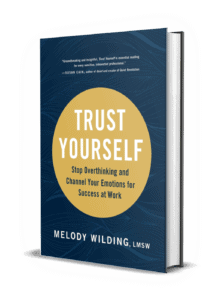Success comes with a unique set of stressors. On a practical level, it’s very difficult to balance a demanding career and your well-being. As you rise higher, you also face greater pressure to perform, which can lead to self-doubt. The flip side of being smart and accomplished is that it’s easy to fall into traps of overthinking, worrying, and perfectionism.
Many people try to compartmentalize their work from their mental health, but the two are inseparable. If you have a passion for what you do, it’s easy to become absorb and desire to give your all to your career. However, ambition can run awry when it leads to overwhelming emotions and negative thoughts.
If you’re one of the 43.8 million people who experience mental health challenges, you know that common work situations — anything from living up to client expectations to speaking up in meetings — can take on heightened stress.
People who are highly accomplished sometimes fear asking for help because they don’t want to be perceived as weak or incapable. Being able to “do it all” is part of your identity. Because of this, you may tell yourself to toughen up and work harder, which only makes things worse.
Speaking up about your mental health can be hard, but it’s essential if work is taking a huge toll on your well-being.
Here are a few ways to have an open, honest conversation about mental well-being to help yourself — and those around you.
1. Decide what to disclose
Disclosure is a very personal decision. For many people, the anxiety and energy they devote to worrying about masking mental health issues at work only adds to the pressure they feel.
While there’s no one answer to how open you should be, there are a few things to consider:
- Are your symptoms starting to interfere with your work and ability to satisfy your job duties? If so, you’ll likely want to further explore speaking with your manager or team, especially if you’re in need of accommodations or going to need time off. If you are requesting accommodations, it’s likely you will be asked about the nature of your condition and you will have to disclose more information.
- What’s your relationship with your manager and team like? Do you communicate often? Do you feel as if you can trust them?
- Consider workplace culture. Some atmospheres may welcome self-disclosure more than others.
- How will it impact you at this stage in your career? If you have a mental health issue that severely impairs your ability to work, you may need to be very upfront and disclose during the interview process. Other times, a personal matter may not develop until you’ve been in a job for a few years and you may consider disclosing only if you see things are getting worse.
- Do you have the proper supports in place outside of the office?
If you do decide to disclose, your employer is obligated to keep your information confidential, just as they are with other health-related information. If you find it’s being used again or inappropriately shared, there are legal actions you can take.
2. Find the right time
In addition to working closely with your doctor and trusted professionals, you can have a conversation with your manager or team about what’s going on. The earlier, the better. If you’re in the thick of a depressive episode, for example, it might be best to wait until you’re in a better place so you have the energy and can bring yourself to the conversation in the best way possible.
You may not need to mention your explicit diagnosis. You can say you have issues with concentration that affect your ability to work, for example, without explaining the ins and outs of your ADHD diagnosis. You could also say you have a medical issue or medical condition without mentioning your diagnosis by name. Only reveal as much as you’re comfortable with.
Come to the table with a plan for any changes you’re proposing, whether that’s a work from home arrangement or asking to be put on a different project. Provide evidence of where you are excelling or doing well at work, and to the best of your ability try focusing the conversation on how you can do more of that. Scripting out the conversation and what you want to say beforehand can be really helpful in easing the anxiety of going into it. Take notes so you have documentation.
3. Realize you’re courageous.
You may be embarrassed or feel awkward. This is a normal reaction. It’s scary and vulnerable to reveal something personal, especially if that’s not common in your work environment. Really give yourself time to weigh the pros and cons. Do not rush into a decision.
You’re also not alone. There are millions of people struggling with mental health issues at work, yet there is a dark cloud of shame over doing so. Luckily as a culture, we’re slowly moving towards more honest conversations and greater acceptance for the fact that modern life increasingly poses more stressors and that an open dialogue around mental health can be healing.
It can help to reframe the situation as an opportunity. Often times speaking with your employer leads to finding solutions. Your team can collaborate with you to create a more optimal working situation. When you’re healthier, happier, and more productive, it benefits everyone.
4. Get the right support
It’s important to work with a licensed therapist to address mental illness. Working with a coach can be a helpful adjunct to therapy. You can learn practical skills to be more assertive and better manage your thoughts and emotions in the workplace.
You may also have access to an employee assistance program (EAP) through your company benefits. EAP’s can provide access to behavioral health services. Ask HR about what’s available. Your employer may also pay for coaching if it benefits your productivity and leadership capacity. Mental Health America, The ADAA, and NAMI are other excellent resources to learn more about mental health issues. They provide local, free, or low-cost resources such as counseling and support groups.
Improving your emotional health doesn’t mean there’s anything wrong with you. In fact, it means you’re courageous.
(This information is for educational and informational purposes only. It is not medical, or mental health care advice.)









